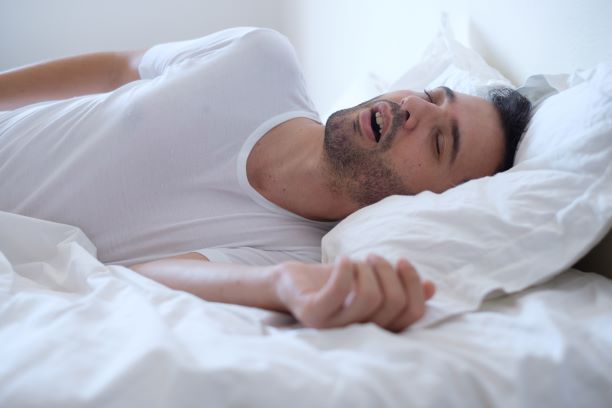A sleep study would be indicated by consistent snoring, feeling unrested after a night’s sleep (frequently), clenching or grinding of the teeth (indicates a high probability of a sleep breathing disorder), or repeated waking throughout the night. Any treatment a Dentist might provide to diagnose or treat a sleep breathing problem, needs the patient’s physician to manage the process by written permission to the dentist.
If someone witnesses or hears you “stop breathing” or gasping, snorting, jerking awake, it’s almost certain that you have Sleep Apnea. There are several ways to evaluate if you have, or the severity of, a sleep-breathing disorder.
PSG: Polysomnogram:
A very sophisticated evaluation of your entire physiologic and neurologic system during sleep. This is important in cases where patients may have several health conditions that might be related to or affected by Sleep Apnea. It’s the best diagnostic test.
Home Sleep Test:
A much simpler evaluation of basic parameters of Sleep Apnea in healthier patients. It can measure heart rate, breathing pauses, oxygen saturation, some can assess basic brain waves too. These are often used to evaluate the effectiveness of Dental Sleep Appliances after the initial Sleep Evaluation was done.
Pulse Oximetry:
Basically, a medical-grade “Fit Bit” with better accuracy. Not often used and doesn’t pick up much data.
If you mention snoring or fatigue to your Physician, they may not suggest having a sleep study. A dentist trained in TMJ or Dental Sleep Medicine can identify oral and other facial features, historical information and 3D imaging evaluations that would strongly suggest the need for a sleep study.
A sleep study must be ordered by a Physician because of the wide-ranging medical problems that Sleep Apnea can directly cause or contribute to such as:
- Hypertension
- A-Fib
- Heart Attack Risk Factor
- Stroke
- Frequent Urination Overnight
- Clenching/Grinding of Teeth
- TMJ Damage from Clenching/Grinding
- Neck Pain or Stiffness
- Nighttime Headaches/Migraines
- Feeling of Fatigue Despite Sleeping 7-8 Hours
A simple “pulse oximetry” test, or information from your “Fit Bit”, may miss critical information that could identify some of these risks based on your medical history and exam by your physician. Most of these conditions are out of the scope, licensure, and experience of Dentist’s to evaluate.
Over my years, we have seen patients who had heart conditions, blood pressure spikes (stroke risk) during sleep that weren’t picked up in their normal medical visits.
For a dentist to provide a Sleep Study, we must contact the Physician and get a written order to dispense a home unit or pulse ox. Dentist’s aren’t legally permitted to diagnose or test for, fabricate a “Snoring” or “Sleep Apnea” appliance without a written prescription from the patient’s Physician or Sleep Physician, which we always obtain.
Snoring IS a form of sleep disorder and must be approached as such.
In our practice, we have different sleep study devices that can be used to assess for the presence of a sleep breathing disorder or assess the success of a Dental Sleep Appliance in treating Sleep Apnea, snoring or other sleep-breathing problems involving oral appliances.
I always notify the patient’s Physician and discuss my findings that would suggest evaluation of a sleep breathing condition. The Physician makes the decision on the type of study that is done.
We work with many physicians and can provide fast, easy, home screenings with physicians written RX of patients we see to for TMJ or facial pain conditions, if indicated.




